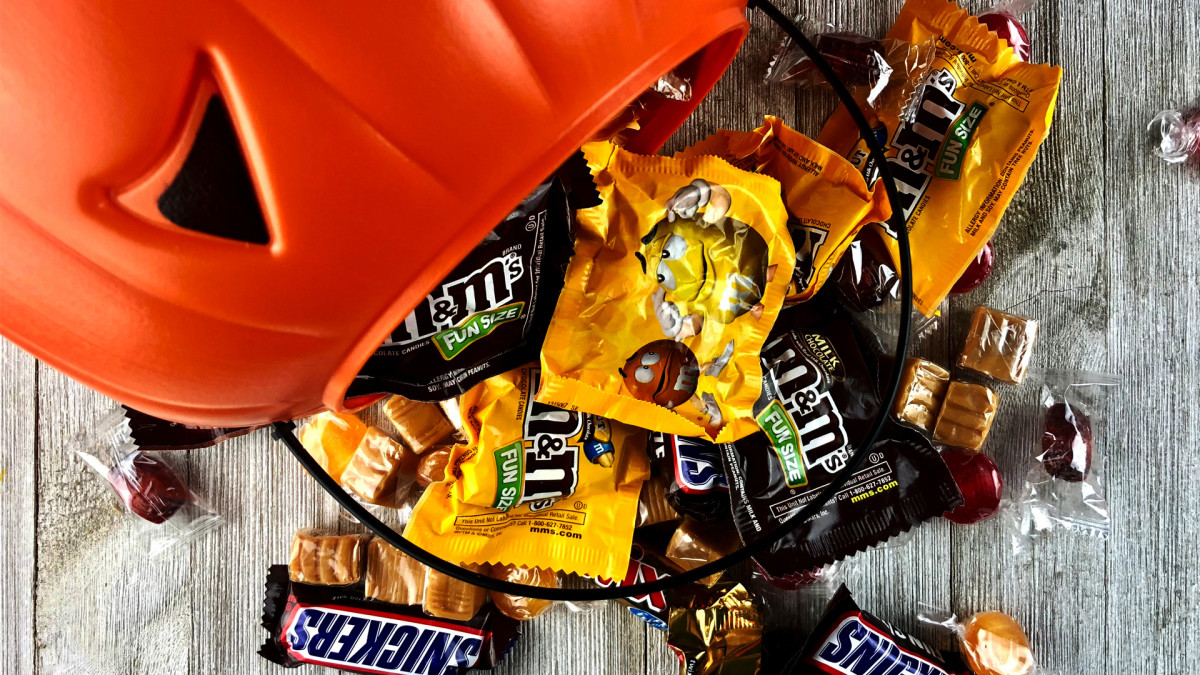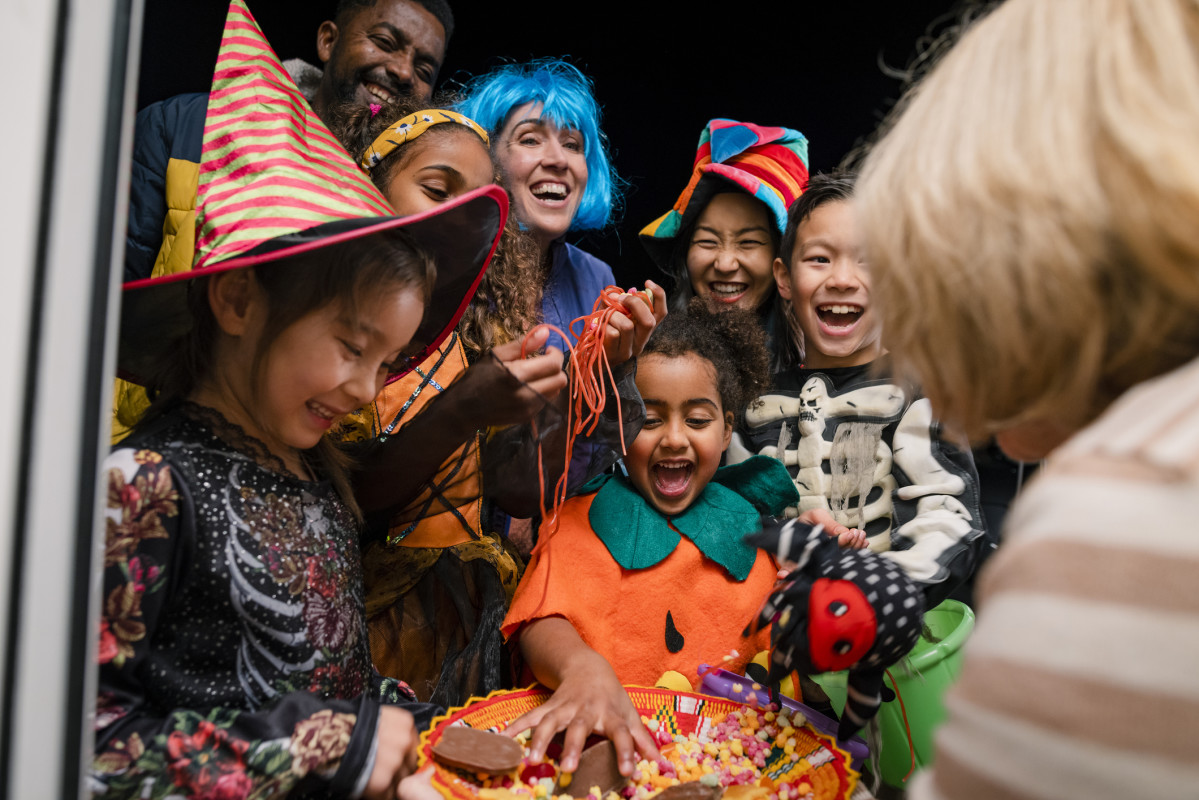
When you think about it, donning a costume and knocking on a stranger’s door expecting free Halloween candy seems a bit … strange.
But Halloween customs date back thousands of years to Scotland and Ireland, having evolved out of the pagan festival of Samhain, during which people believed ancient burial mounds opened, and spirits roamed the earth. To protect themselves from wandering ghouls, they built great bonfires, carved faces into pumpkins and turnips, and disguised their own appearances with animistic masks and costumes.

SolStock; Getty images
As the tradition evolved, folks celebrated Halloween by dressing up as ghosts or skeletons, going door-to-door, and staging short plays. The best were rewarded with tasty refreshments, but candies wouldn’t come around until the 1920s. Instead, the earliest Halloween sweets were fruits like apples.
Most modern trick-or-treaters forgo the Halloween mischief and focus instead on sugary treats, turning a once-religious occasion into a very commercial event. Halloween is now the second-largest holiday in the United States — only Christmas is bigger — with Americans spending $3.1 billion, or $25 per household, on Halloween candy in 2022 alone.
Related: Why buying Halloween candy this year could come with an unpleasant surprise
Halloween isn’t just for kids, though; on this haunted holiday, adults also dress up, host parties, or just make sure their home is stocked with Halloween candies before the trick-or-treaters arrive. Even Tesla’s Elon Musk gets into the Halloween spirit — and in case you’re wondering, his favorite candies are chocolates, preferably made by Ghirardelli, a Lindt (LDSVF) -) brand.
Halloween with my Mom pic.twitter.com/xOAgNeeiNN
— Elon Musk (@elonmusk) November 1, 2022
When does Halloween candy come out?
Bulk bags of Halloween candy weren’t available in pagan times; lucky for us, they are all but ubiquitous today. In fact, it seems like stores roll out their Halloween candy earlier and earlier each year so that Halloween can seep into more than one sales quarter. By introducing Halloween candy before October, retailers encourage customers to start shopping early, allowing them, in turn, to mint another month (or two or three) of profits.
Walmart (WMT) -) puts its Halloween candy out in late September, but other big retailers start even earlier: Dollar General (DG) -) and Sam’s Club roll out their Halloween candies in August, before Labor Day. Target (TGT) -) unveils its Halloween section even earlier, beginning in late July.
Confectioners like The Hershey Co. (HSY) -), the brand behind some of the most popular Halloween candy, including Reese’s Peanut Butter Cups, KitKats, and Twizzlers, start ramping up their chocolate production as soon as spring begins. As stated in its Q3 2022 earnings, Halloween candy accounts for a whopping 10% of Hershey’s total annual sales.
You might even say that online retailers, like Amazon (AMZN) -), never stop selling Halloween candy, although Amazon announces specific markdowns to bags of Halloween candy during Prime Days in October, open exclusively to Amazon Prime members.
But the best time to get the cheapest Halloween candy happens after October 31, when prices are cut by 75% or more. And with preservatives extending the shelf lives of popular Halloween candies to over a year, that means you can shop big—and save some money for next year.
View the original article to see embedded media.
Where to find the best Halloween candy
600 million pounds of candy are consumed on Halloween, giving the sweet tooths among us an excuse to load up in anticipation of October 31. Here’s where you can get your fill.
Warehouse Clubs
If you’re looking to buy in bulk, consider shopping at a warehouse club like Sam’s Club or Costco (COST) -). Annual memberships range between $50 and $60, but in-store discounts are steep. For example, you can snag a 36-count package of full-sized (yep, the big ones) Reese’s Peanut Butter Cups at Costco for just $39—that’s a little over a dollar a candy bar.
Online Retailers
Everyday deals can be found online at Amazon — consider them your “one and done” source for Halloween: A 365-count variety package of M&M's, Snickers, and Milky Way candy bars sells on Amazon for under $30.
Big-Box Stores
And if you have fewer Halloween buckets to fill, Walmart sells bags of Halloween candy for under $5, such as 10-ounce bags of Snickers, Twix, or Butterfinger — to name a few.
View the original article to see embedded media.
Which Halloween candies do trick-or-treaters prefer?
Putting up Halloween decorations and turning on your porch lights practically screams that your home is brimming with Halloween candies begging to be eaten.
But which ones do trick-or-treaters like best?
According to dental group Shiny Smile Veneers, which surveyed over 1,000 Halloween candy consumers across America, Reese’s Peanut Butter Cups came in as the #1 best-loved Halloween candy. The heavenly, peanut-butter-filled chocolate discs gained 48.2% of the vote, while two varieties of M&M’s — Plain and Peanut — found their place among the top five, along with KitKat and Snickers.
Most Popular Halloween Candy
| Rank | Candy | Percent of Vote |
|---|---|---|
1. |
Reese’s Peanut Butter Cups |
48.2% |
2. |
M&M’s |
41% |
3. |
KitKat |
41.1% |
4. |
Peanut M&M’s |
33.1% |
5. |
Snickers |
33.1% |
Interestingly, candy corn ranked as the top Halloween candy people hated getting, followed by two cinnamon-spiced sweets, Hot Tamales and the Atomic Fireballs. Jawbreaker and Bit-o-Honey rounded out the Worst 5.
Least Popular Halloween Candy
| Rank | Candy | Percent of Vote |
|---|---|---|
1. |
Candy Corn |
36% |
2. |
Hot Tamales |
26.1% |
3. |
Atomic Fireball |
23.9% |
4. |
Jawbreaker |
21.7% |
5. |
Bit-o-Honey |
21.6% |
The dental group added that Americans spend an average of $538.28 on dental repairs after eating Halloween treats. Unsurprisingly, the treats they labeled “most dangerous” were also people’s least favorite: the basically impossible-to-bite Jawbreaker and the honey-flavored tacky taffy, Bit-o-Honey.
Maybe we should be handing out toothbrushes along with our Halloween candy this year.







